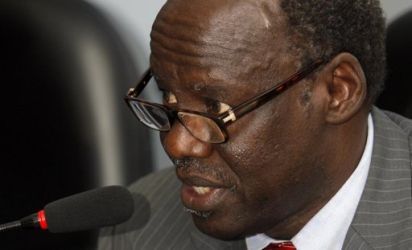S. Sudan opposition leader returns after years in exile
November 2, 2013 (JUBA) – Lam Akol, the leader of the main opposition party in South Sudan returned to the country on Saturday, bringing to an end over two years of self-imposed exile.

He was accused of supporting a rebellion in his home state of Upper Nile to destabilise the country, an allegation he repeatedly denied.
On arrival at Juba airport, however, the SPLM-DC leader said he was happy to return home, adding it was time for South Sudanese to put aside their differences and work together for prosperity.
“The time has come for all the people of South Sudan to come together and work for the success of this new nation,” Lam told reporters in the capital, Juba.
Akol, a former member of the governing Sudan People’s Liberation Movement (SPLM), previously served as Sudan’s minister of foreign affairs from 2005 to October 2007 under the Comprehensive Peace Agreement (CPA) signed in 2005.
In 2010, he unsuccessfully challenged Kiir for the presidency, garnering only 7% of votes in an election, which he claimed, was highly flawed in favour of the incumbent.
LAM INNOCENT?
A section of the country’s population expressed mixed reactions over Kiir’s decision to pardon his main rival in the elections, while others questioned his intentions.
“Much as I welcome the decision of the president to pardon those militia leaders, which is a sign of peace and harmony, I do not understand what crime has Lam Akol committed for him to be included”, said a citizen, who spoke on condition of anonymity.
“The president is being misled. Being in opposition does not amount to rebellion”, he added.
Simon Deng, a native of Jonglei based in Juba said he was still not aware of what charges Akol was being pardoned for.
“I have never heard what he was accused of. I thought he was only being criticised for staying in Khartoum. Is the pardon for having been self-exiled, or what? I do not understand. What really has [he] done?” asked Deng.
Urbano Othwon, a native of Upper Nile state currently based in Juba, said the government could not substantiate the claims it made, even when it was challenged to prove it in court.
“It was just allegations. The government could not provide proof of the allegations. Lam and the SPLM-DC leadership went to court with the SPLM in Khartoum he won the case when Sudan was still one country. So, the issuance of the order of pardon is misplaced, though the intention of the president may be for good reason”, he said.
(ST)
